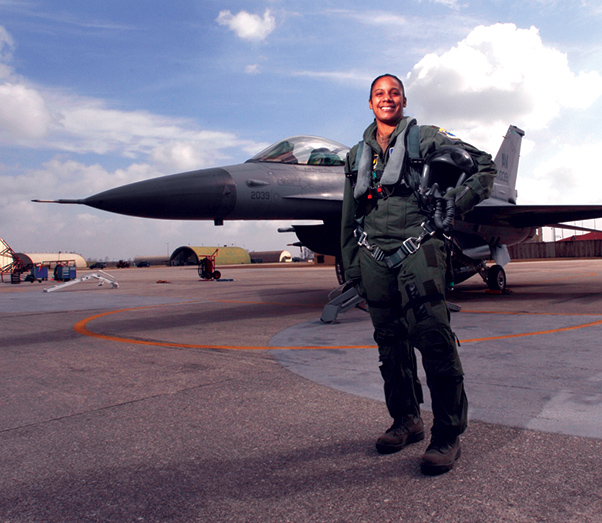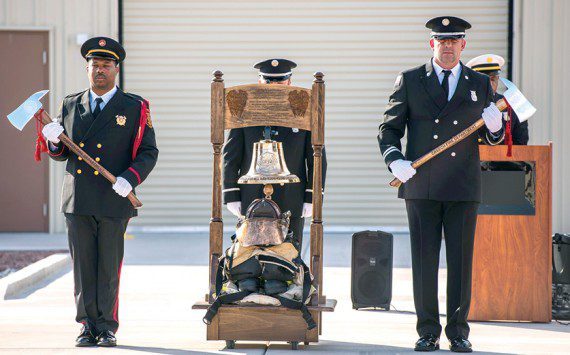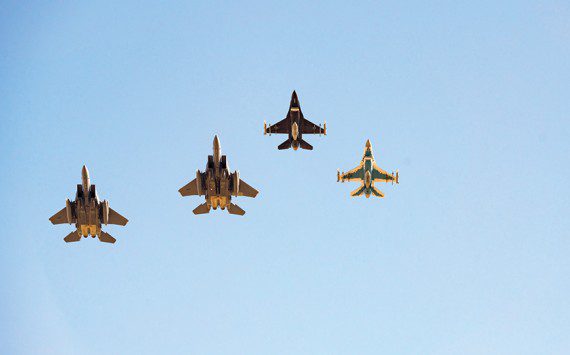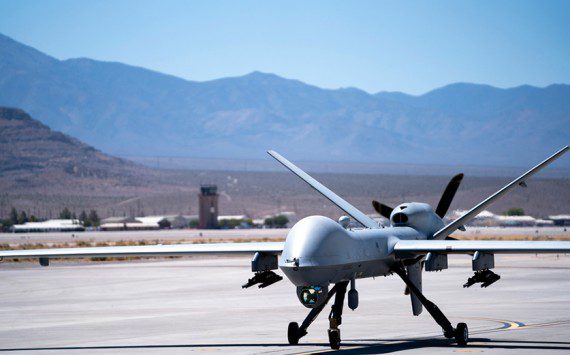Lt. Col. Shawna Rochelle Kimbrell is the first female African American fighter pilot in the history of U.S. Air Force.
She flew the F-16 Fighting Falcon during combat missions in Operation Northern Watch over northern Iraq.
She is stationed at Nellis Air Force Base where she is a member of the 78th Attack Squadron, an Air Force Reserve Command unit under the 926th Wing, Nellis Air Force Base, Nev., where she serves as an MQ-9 Pilot and mission commander.
Kimbrell was born in Lafayette, Ind., the youngest of four children, to Guyanese parents. Her mother and father, Eve Blackman Ng A Qui and Dr. Norman Ng A Qui migrated to the United States for educational opportunities and became naturalized U.S. citizens by the time she was born.
Their hard work and dedication paid off in her father earning a degree from Howard University and a doctorate from Purdue University, which in turn earned him a job offer in Parker, Colo.
That focus on education was a big part of life for Kimbrell and her three older siblings as they spent their school years in Parker.
“(Education) was the thing that opened doors,” Kimbrell said. “If you got your education, you could do whatever you wanted to do. That was how our house was run.”
On top of that family modus operandi, Kimbrell had a goal-driven personality from an early age. While in kindergarten, for example, she decided she wanted to be an astronaut, so she wrote a letter to NASA asking how she could join the program. But as she got older and did more research into joining the astronaut corps, she realized the career wasn’t as exciting as she wanted it to be.
“I decided to focus on something I could do every day versus maybe going to the moon one time … which would be awesome, but it’s just one time,” the major said. “So I started to look at the jets and flying fighters.”
In fourth grade, Kimbrell decided she wanted to become a fighter pilot.
She joined the Civil Air Patrol, worked at air shows, had her first flying lesson at 14, and earned her private pilot’s license. Eventually, she was accepted into the Air Force Academy. She did all of this despite people telling her as a child that there were no female fighter pilots, people asking her about all the what-ifs that would derail her plans.
“I think what kept me on the straight and narrow is that I didn’t give myself any other options,” Kimbrell said. “I didn’t think about a back-up plan, I didn’t think about a ‘what if it doesn’t work out plan.’
“I think sometimes you lull yourself into thinking, ‘OK, I have that plan, and if it gets hard I’ll go to the back-up plan,’” she added. “If you don’t have it, you push through.”
And push through she did. Kimbrell graduated from the Academy in 1998 and was accepted into pilot training. She earned her pilot wings in August 1999.
“I was in constant competition with myself, trying to do better, to make the grade,” the F-16 Fighting Falcon pilot said. “There were times when I didn’t think that I was going to make it through. It was in those times I learned to be humble and realize there is a point in everyone’s struggle — no matter how strong they are — when they need help, and the key is to seek it out before it is too late.”
Kimbrell attended undergraduate pilot training at Laughlin AFB, Texas, and received her commission in 1998 after graduating from the Air Force Academy. Later, she attended Undergraduate Pilot Training at Laughlin AFB, Texas, and was awarded her pilot wings in August 1999. She then completed Introduction to Fighter Fundamental training at Randolph AFB, Texas, in November 1999. In August 2000, she graduated from her initial F-16 training at Luke AFB, Ariz., becoming the first African American female fighter pilot in the U.S. Air Force.
She was assigned to the 13th Fighter Squadron, Misawa, Japan, for her first operational assignment. During this time she was deployed to Turkey and Saudi Arabia in support of Operation Northern and Southern Watch. Her flights in Operation Northern Watch marked her as the first female pilot to fly combat missions for Misawa’s 35th Fighter Wing. Additionally, during Operation Northern Watch she became the first African American female pilot to employ ordnance in combat.
“The sorties (in Operation Northern Watch) were actually anticlimactic until I recognized that people were actually shooting at us,” Kimbrell said.
In July 2004, she graduated from the Joint Fire Control Course and was assigned to the 15th Air Support Operations Squadron. Later she deployed as the 2nd Brigade Air Liaison Officer in support of Operation Iraqi Freedom.
Over the years, Kimbrell finds time to speak to children about dreaming big. She said she finds that a lot of children aren’t told that they can achieve their dreams and don’t realize that a lot of barriers have been knocked down.
“I literally see the lights turn on in kids’ eyes when I talk to them when they realize that someone like me can go do something as cool as (being a fighter pilot),” Kimbrell said. “It’s really awesome to be able to go out and talk to them and have them light up and say, ‘I’ve heard people say that you can do whatever you want, but now I can put a face to the story and I can see that it can be done, which means I can go out and do whatever I want to do.’ That is what I focus on and what I think is really important.”
Of course part of her speeches focus on education, as that is what her parents instilled in her. But she also tries to show the children and even the adults that reaching those big dreams, no matter what age you are or what you look like, starts with setting a goal. She uses an analogy of building a road.
“It’s really hard to build a road if you don’t know where you’re going,” Kimbrell said. “A lot of people have goals, but don’t really put them into context. If a goal is really your end state, you have to look at the terrain you have to go through to get there, how you’re going to build that road and what you’re going to do.
“Nothing’s easy,” she added. “Expect road blocks, expect that there are going to be people out there who don’t want you to succeed, expect people are going to tell you no. But the desire that comes from within — if it’s something that you really want — will carry you through.”
Editor’s note: Tech. Sgt. Benjamin Rojek contributed to this report.
DON'T FORGET TO SUBSCRIBE
Get the latest news from Desert Lightning News at Nellis & Creech AFB












